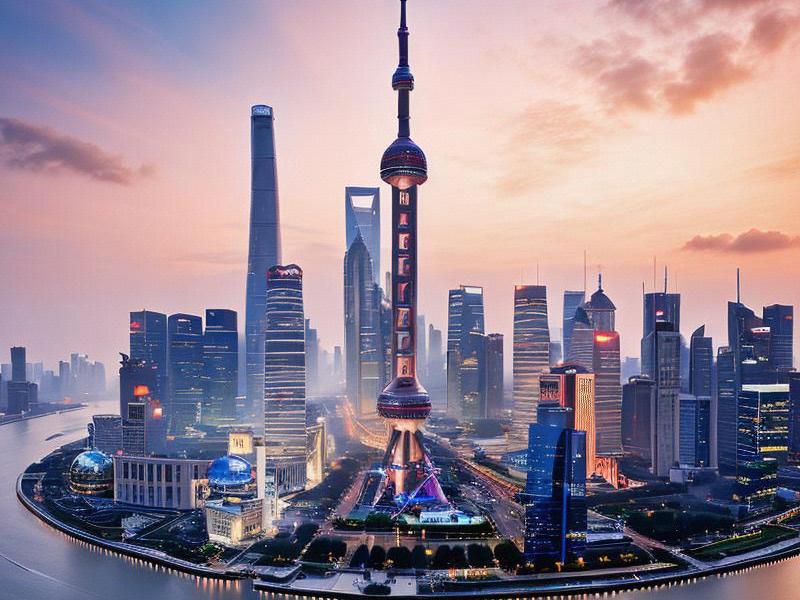
Shanghai, the bustling metropolis on the banks of the Huangpu River, has long been a symbol of China's economic prowess. Over the past few decades, it has not only solidified its position as a global financial center but has also emerged as a beacon of innovation and technological advancement. This transformation is a testament to Shanghai's strategic vision and its commitment to fostering a dynamic environment that attracts talent, encourages entrepreneurship, and drives technological progress.
The journey of Shanghai towards becoming a global innovation hub is marked by several key milestones. One of the most significant was the establishment of the Zhangjiang Hi-Tech Park in the late 1990s. Initially conceived as a high-tech industrial zone, Zhangjiang has evolved into a vibrant ecosystem that houses numerous research institutions, startups, and multinational corporations. It has become synonymous with innovation in China, attracting some of the brightest minds and most ambitious projects in the fields of biotechnology, information technology, and advanced materials.
Another pivotal moment was the launch of the Shanghai Free-Trade Zone in 2013. This initiative was designed to crteeaa more open and business-friendly environment, facilitating trade and investment. The Free-Trade Zone has been instrumental in attracting foreign direct investment, particularly in the technology sector. It has also served as a testing ground for various reforms, including intellectual property protection, financial liberalization, and streamlined administrative procedures, which have had a ripple effect on the broader business landscape of Shanghai.
上海夜网论坛 The city's commitment to innovation is further evidenced by its robust support for startups and entrepreneurship. Shanghai has established numerous incubators and accelerators, such as the ShanghaiTech University Entrepreneurship Center and the iFlytek Innovation Base, which provide resources, mentorship, and funding to early-stage companies. These initiatives have helped cultivate a thriving startup culture, with many of these companies going on to achieve significant success both domestically and internationally.
One of the most striking aspects of Shanghai's innovation ecosystem is its emphasis on collaboration between academia, industry, and government. The city has leveraged its world-class universities, such as Fudan University and Tongji University, to drive research and development. These institutions have established partnerships with industry leaders and government agencies to tackle pressing challenges and develop cutting-edge solutions. For instance, the Shanghai Advanced Research Institute (SARI) is a joint initiative between the Chinese Academy of Sciences and the Shanghai Municipal Government, focusing on advanced materials, energy, and information technology.
Shanghai's strategic location and infrastructure have also played a crucial role in its rise as an innovation hub. The city is well-connected by air, sea, and land, making it a gateway for international trade and collaboration. Its modern transportation network, including the Maglev train, high-speed rail, and extensive metro system, ensures seamless connectivity within the city and beyond. Additionally, Shanghai's skyline, dominated by iconic landmarks such as the Oriental Pearl Tower and the Shanghai Tower, symbolizes its status as a global metropolis and a hub of innovation.
上海喝茶群vx The city's cultural diversity and openness to the world have further contributed to its innovative spirit. Shanghai has long been a melting pot of cultures, attracting people from all over the globe. This diversity has fostered a rich exchange of ideas and perspectives, which are essential for driving innovation. The city's cosmopolitan atmosphere, coupled with its vibrant arts and entertainment scene, makes it an attractive destination for talent and businesses alike.
However, Shanghai's journey to becoming a global innovation hub has not been without challenges. The rapid pace of urbanization and economic growth has brought about issues such as housing shortages, environmental concerns, and traffic congestion. Addressing these challenges requires a balanced approach that prioritizes sustainable development while maintaining the city's momentum towards innovation.
上海品茶论坛 In recent years, Shanghai has taken significant steps to promote sustainability and green technologies. The city has set ambitious targets for reducing carbon emissions and increasing the use of renewable energy. Initiatives such as the construction of green buildings, the expansion of public transportation, and the promotion of electric vehicles are part of Shanghai's broader strategy to crteeaa more sustainable and livable city.
The global landscape of innovation is also evolving rapidly, with new technologies such as artificial intelligence, blockchain, and quantum computing reshaping industries and economies. Shanghai recognizes the importance of staying at the forefront of these developments and has established research centers and innovation clusters dedicated to exploring these cutting-edge fields. For example, the Shanghai Artificial Intelligence Laboratory is focused on advancing AI research and applications, while the Shanghai Quantum Science and Technology Center aims to drive progress in quantum computing.
In conclusion, Shanghai's transformation into a global innovation hub is a remarkable achievement that reflects the city's strategic vision, commitment to sustainability, and openness to the world. By fostering a dynamic ecosystem that encourages collaboration, supports entrepreneurship, and drives technological progress, Shanghai has positioned itself as a leader in the global innovation landscape. As the city continues to evolve, it will undoubtedly play a pivotal role in shaping the future of technology and economic development on the world stage.
